Thumbprint: A Story Read online
Page 3
“Mal,” he said. “This is yours, right? Your name on it.”
She turned. Petty was at the cash register, holding a fat envelope toward her. She took it.
“That the money Glen gave you, to swap for his wedding ring?” Petty turned away from her, shifting his attention back to the register. He pulled out stacks of bills, rubber-banded them, and lined them up on the bar. “That’s something. Taking his money and fucking him all over again. You think I plop down five hundred bucks you’d fuck me just as nice?”
As he spoke, he put his hand back in the register. Mal reached under his elbow and slammed the drawer on his fingers. He squealed. The drawer began to slide open again on its own, but before he could get his mashed fingers out, Mal slammed it once more. He lifted one foot off the floor and did a comic little jig.
“Ohfuckgoddamnyouuglydyke,” he said.
“Hey,” said Bill Rodier, coming toward the bar carrying a trash barrel. “Hey.”
She let Petty get his hand out of the drawer. He stumbled clumsily away from her, struck the bar with his hip, and wheeled to face her, clutching the mauled hand to his chest.
“You crazy bitch! I think you broke my fingers!”
“Jesus, Mal,” Bill said, looking over the bar at Petty’s hand. His fat fingers had a purple line of bruise across them. Bill turned his questioning gaze back in her direction. “I don’t know what the hell John said, but you can’t do that to people.”
“You’d be surprised what you can do to people,” she told him.
OUTSIDE, IT WAS drizzling and cold. She was all the way to her car before she felt a weight in one hand and realized she was still clutching the envelope full of cash.
Mal kept on holding it, against the inside of her thigh, the whole drive back. She didn’t put on the radio, just drove and listened to the rain tapping on the glass. She had been in the desert for two years, and she had seen it rain just twice during that time, although there was often a moist fog in the morning, a mist that smelled of eggs, of brimstone.
When she enlisted, she had hoped for war. She did not see the point of joining if you weren’t going to get to fight. The risk to her life did not trouble her. It was an incentive. You received a two-hundred-dollar-a-month bonus for every month you spent in the combat zone, and a part of her had relished the fact that her own life was valued so cheap. Mal would not have expected more.
But it didn’t occur to her, when she first learned she was going to Iraq, that they paid you that money for more than just the risk to your own life. It wasn’t just a question of what could happen to you, but also a matter of what you might be asked to do to others. For her two-hundred-dollar bonus, she had left naked and bound men in stress positions for hours and told a nineteen-year-old girl that she would be gang-raped if she did not supply information about her boyfriend. Two hundred dollars a month was what it cost to make a torturer out of her. She felt now that she had been crazy there, that the Vivarin, the ephedra, the lack of sleep, the constant scream-and-thump of the mortars, had made her into someone who was mentally ill, a bad-dream version of herself. Then Mal felt the weight of the envelope against her thigh, Glen Kardon’s payoff, and remembered taking his ring, and it came to her that she was having herself on, pretending she had been someone different in Iraq. Who she’d been then and who she was now were the same person. She had taken the prison home with her. She lived in it still.
Mal let herself into the house, soaked and cold, holding the envelope. She found herself standing in front of the kitchen counter with Glen’s money. She could sell him back his own ring for five hundred dollars if she wanted, and it was more than she would get from any pawnshop. She had done worse, for less cash. She stuck her hand down the drain, felt along the wet smoothness of the trap, until her fingertips found the ring.
Mal hooked her ring finger through it, pulled her hand back out. She turned her wrist this way and that, considering how the ring looked on her crooked, blunt finger. With this I do thee wed. She didn’t know what she’d do with Glen Kardon’s five hundred dollars if she swapped it for his ring. It wasn’t money she needed. She didn’t need his ring either. She couldn’t say what it was she needed, but the idea of it was close, a word on the tip of her tongue, maddeningly out of reach.
She made her way to the bathroom, turned on the shower, and let the steam gather while she undressed. Slipping off her black blouse, she noticed she still had the envelope in one hand, Glen’s ring on the third finger of the other. She tossed the money next to the bathroom sink, left the ring on.
She glanced at the ring sometimes while she was in the shower. She tried to imagine being married to Glen Kardon, pictured him stretched out on her father’s bed in boxers and a T-shirt, waiting for her to come out of the bathroom, his stomach aflutter with the anticipation of some late-night, connubial action. She snorted at the thought. It was as absurd as trying to imagine what her life would’ve been like if she had become an astronaut.
The washer and dryer were in the bathroom with her. She dug through the Maytag until she found her Curt Schilling T-shirt and a fresh pair of Hanes. She slipped back into the darkened bedroom, toweling her hair, and glanced at herself in the dresser mirror, only she couldn’t see her face, because a white sheet of paper had been stuck into the top of the frame and it covered the place where her face belonged. A black thumbprint had been inked in the center. Around the edges of the sheet of paper, she could see reflected in the mirror a man stretched out on the bed, just as she had pictured Glen Kardon stretched out and waiting for her, only in her head Glen hadn’t been wearing gray-and-black fatigues.
She lunged to her side, going for the kitchen door. But Anshaw was already moving, launching himself at her, driving his boot into her right knee. The leg twisted in a way it wasn’t meant to go, and she felt her ACL pop behind her knee. Anshaw was right behind her by then, and he got a handful of her hair. As she went down, he drove her forward and smashed her head into the side of the dresser.
A black spoke of pain lanced down into her skull, a nail gun fired straight into the brain. She was down and flailing, and he kicked her in the head. That kick didn’t hurt so much, but it took the life out of her, as if she were no more than an appliance and he had jerked the power cord out of the wall.
When he rolled her onto her stomach and twisted her arms behind her back, she had no strength in her to resist. He had the heavy-duty plastic ties, the flex cuffs they used on the prisoners in Iraq sometimes. He sat on her ass and squeezed her ankles together and put the flex cuffs on them, too, tightening until it hurt, and then some. Black flashes were still firing behind her eyes, but the fireworks were smaller and exploding less frequently now. She was coming back to herself, slowly. Breathe. Wait.
When her vision cleared, she found Anshaw sitting above her, on the edge of her father’s bed. He had lost weight, and he hadn’t any to lose. His eyes peeked out, too bright at the bottoms of deep hollows, moonlight reflected in the water at the bottom of a long well. In his lap was a bag, like an old-fashioned doctor’s case, the leather pebbled and handsome.
“I observed you while you were running this morning,” he began, without preamble. Using the word “observed,” like he would in a report on enemy troop movements. “Who were you signaling when you were up on the hill?”
“Anshaw,” Mal said. “What are you talking about, Anshaw? What is this?”
“You’re staying in shape. You’re still a soldier. I tried to follow you, but you outran me on the hill this morning. When you were on the crest, I saw you flashing a light. Two long flashes, one short, two long. You signaled someone. Tell me who.”
At first she didn’t know what he was talking about; then she did. Her canteen. Her canteen had flashed in the sunlight when she tipped it up to drink. She opened her mouth to reply, but before she could, he lowered himself to one knee beside her. Anshaw unbuckled his bag and dumped the contents on
to the floor. He had a collection of tools: a pair of heavy-duty shears, a Taser, a hammer, a hacksaw, a portable vise. Mixed in with the tools were five or six human thumbs.
Some of the thumbs were thick and blunt and male, and some were white and slender and female, and some were too shriveled and darkened with rot to provide much of any clue about the person they had belonged to. Each thumb ended in a lump of bone and sinew. The inside of the bag had a smell, a sickly-sweet, almost floral stink of corruption.
Anshaw selected the heavy-duty shears.
“You went up the hill and signaled someone this morning. And tonight you came back with a lot of money. I looked in the envelope while you were in the shower. So you signaled for a meeting, and at the meeting you were paid for intel. Who did you meet? CIA?”
“I went to work. At the bar. You know where I work. You followed me there.”
“Five hundred dollars. Is that supposed to be tips?”
She didn’t have a reply. She couldn’t think. She was looking at the thumbs mixed in with his mess of tools.
He followed her gaze, prodded a blackened and shriveled thumb with the blade of the shears. The only identifiable feature remaining on the thumb was a twisted, silvery fishhook scar.
“Plough,” Anshaw said. “He had helicopters doing flyovers of my house. They’d fly over once or twice a day. They used different kinds of helicopters on different days to try and keep me from putting two and two together. But I knew what they were up to. I started watching them from the kitchen with my field glasses, and one day I saw Plough at the controls of a radio-station traffic copter. I didn’t even know he knew how to pilot a bird until then. He was wearing a black helmet and sunglasses, but I still recognized him.”
As Anshaw spoke, Mal remembered Corporal Plough trying to open a bottle of Red Stripe with the blade of his bayonet and the knife slipping, catching him across the thumb, Plough sucking on it and saying around his thumb, Motherfuck, someone open this for me.
“No, Anshaw. It wasn’t him. It was just someone who looked like him. If he could fly a helicopter, they would’ve had him piloting Apaches over there.”
“Plough admitted it. Not at first. At first he lied. But eventually he told me everything, that he was in the helicopter, that they’d been keeping me under surveillance ever since I came home.” Anshaw moved the tip of the shears to point at another thumb, shriveled and brown, with the texture and appearance of a dried mushroom. “This was his wife. She admitted it, too. They were putting dope in my water to make me sluggish and stupid. Sometimes I’d be driving home and I’d forget what my own house looked like. I’d spend twenty minutes cruising around my development before I realized I’d gone by my place twice.”
He paused, moved the tip of the shears to a fresher thumb, a woman’s, the nail painted red. “She followed me into a supermarket in Poughkeepsie. This was while I was on my way north, to see you. To see if you had been compromised. This woman in the supermarket, she followed me aisle to aisle, always whispering on her cell phone. Pretending not to look at me. Then, later, I went into a Chinese place and noticed her parked across the street, still on the phone. She was the toughest to get solid information out of. I almost thought I was wrong about her. She told me she was a first-grade teacher. She told me she didn’t even know my name and that she wasn’t following me. I almost believed her. She had a photo in her purse, of her sitting on the grass with a bunch of little kids. But it was tricked up. They used Photoshop to stick her in that picture. I even got her to admit it in the end.”
“Plough told you he could fly helicopters so you wouldn’t keep hurting him. The first-grade teacher told you the photo was faked to make you stop. People will tell you anything if you hurt them badly enough. You’re having some kind of break with reality, Anshaw. You don’t know what’s true anymore.”
“You would say that. You’re part of it. Part of the plan to make me crazy, make me kill myself. I thought the thumbprints would startle you into getting in contact with your handler, and they did. You went straight to the hills to send him a signal. To let him know I was close. But where’s your backup now?”
“I don’t have backup. I don’t have a handler.”
“We were friends, Mal. You got me through the worst parts of being over there, when I thought I was going crazy. I hate that I have to do this to you. But I need to know who you were signaling. And you’re going to tell. Who did you signal, Mal?”
“No one,” she said, trying to squirm away from him on her belly.
He grabbed her hair and wrapped it around his fist, to keep her from going anywhere. She felt a tearing along her scalp. He pinned her with a knee in her back. She went still, head turned, right cheek mashed against the nubbly rug on the floor.
“I didn’t know you were married. I didn’t notice the ring until just tonight. Is he coming home? Is he part of it? Tell me.” Tapping the ring on her finger with the blade of the shears.
Mal’s face was turned so she was staring under the bed at the case with her M4 and bayonet in it. She had left the clasps undone.
Anshaw clubbed her in the back of the head, at the base of the skull, with the handles of the shears. The world snapped out of focus, went to a soft blur, and then slowly her vision cleared and details regained their sharpness, until at last she was seeing the case under the bed again, not a foot away from her, the silver clasps hanging loose.
“Tell me, Mal. Tell me the truth now.”
In Iraq the Fedayeen had escaped the handcuffs after his thumbs were broken. Cuffs wouldn’t hold a person whose thumb could move in any direction . . . or someone who didn’t have a thumb at all.
Mal felt herself growing calm. Her panic was like static on a radio, and she had just found the volume, was slowly dialing it down. He would not begin with the shears, of course, but would work his way up to them. He meant to beat her first. At least. She drew a long, surprisingly steady breath. Mal felt almost as if she were back on Hatchet Hill, climbing with all the will and strength she had in her, for the cold, open blue of the sky.
“I’m not married,” she said. “I stole this wedding ring off a drunk. I was just wearing it because I like it.”
He laughed: a bitter, ugly sound. “That isn’t even a good lie.”
And another breath, filling her chest with air, expanding her lungs to their limit. He was about to start hurting her. He would force her to talk, to give him information, to tell him what he wanted to hear. She was ready. She was not afraid of being pushed to the edge of what could be endured. She had a high tolerance for pain, and her bayonet was in arm’s reach, if only she had an arm to reach.
“It’s the truth,” she said, and with that, PFC Mallory Grennan began her confession.
Read on for an excerpt from Joe Hill’s new novel,
NOS4A2
on sale April 30, 2013
Presbyterian Hospital, Denver
Spring 2013
WHEN SOMEONE INTERESTING was dead, Hicks always took a picture with them.
There had been a local news anchor, a pretty thirty-two-year-old with splendid white-blond hair and pale blue eyes, who got wasted and choked to death on her own puke. Hicks had slipped into the morgue at 1:00 A.M., pulled her out of her drawer, and sat her up. He got an arm around her and bent down to lap at her nipple, while holding out his cell phone to take a shot. He didn’t actually lick her, though. That would’ve been gross.
There was a rock star, too—a minor rock star anyway. He was the one in that band that had the hit from the Stallone movie. The rock star wasted out from cancer and in death looked like a withered old woman, with his feathery brown hair and long eyelashes and wide, somehow feminine lips. Hicks got him out of the drawer and bent his hand into devil’s horns, then leaned in and threw the horns himself, snapped a shot of them hanging out together. The rock star’s eyelids sagged, so he looked sleepy and cool.
Hicks’s girlfriend, Sasha, was the one who told him there was a famous serial killer down in the morgue. Sasha was a nurse in pediatrics, eight floors up. She loved his photos with famous dead people; she was always the first person he e-mailed them to. Sasha thought Hicks was hilarious. She said he ought to be on The Daily Show. Hicks was fond of Sasha, too. She had a key to the pharmacy locker, and Saturday nights she’d filch them something good, a little oxy or some medical-grade coke, and on breaks they’d find an empty delivery room and she’d shimmy out of the bottoms of her loose nurse jammies and climb up into the stirrups.
Hicks had never heard of the guy, so Sasha used the computer in the nurses’ station to pull up a news story about him. The mug shot was bad enough, a bald guy with a narrow face and a mouthful of sharp, crooked teeth. His eyes were bright and round and stupid in their hollow sockets. The caption identified him as Charles Talent Manx, sent to the federal pen more than a decade before for burning some sorry motherfucker to death in front of a dozen witnesses.
“He’s not any big deal,” Hicks said. “He just killed one dude.”
“Un-uh. He’s worse than John Wayne Stacy. He killed, like, all kinds of kids. All kinds. He had a house where he did it. He hung little angels in the trees, one for every one he cut up. It’s awesome. It’s like creepy symbolism. Little Christmas angels. They called the place the Sleigh House. Get it? Do you get it, Hicks?”
“No.”
“Like he slayed ’em there? But also like Santa’s sleigh? Do you get it now?” she said.
“No.” He didn’t see what Santa had to do with a guy like Manx.
“The house got burnt down, but the ornaments are still there, hanging in the trees, like a memorial.” She tugged at the drawstring of her scrubs. “Serial killers get me hot. All I can think about is all the nasty shit I’d do to keep ’em from killing me. You go take a pic with him and e-mail it to me. And, like, tell me what you’re going to do if I don’t get naked for you.”

 The Fireman
The Fireman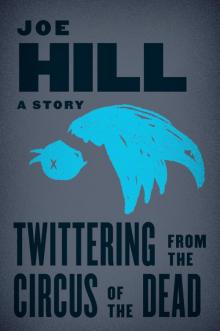 Twittering From the Circus of the Dead
Twittering From the Circus of the Dead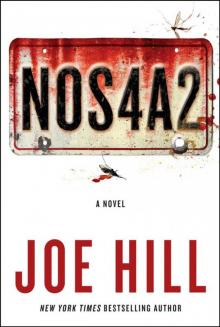 Nos4a2
Nos4a2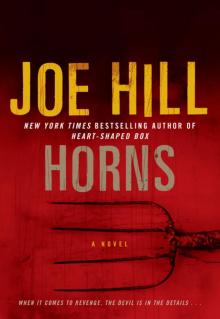 Horns
Horns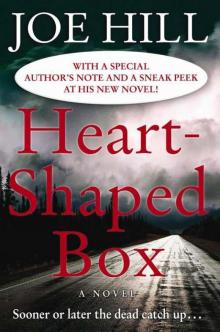 Heart-Shaped Box
Heart-Shaped Box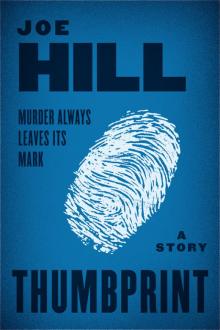 Thumbprint: A Story
Thumbprint: A Story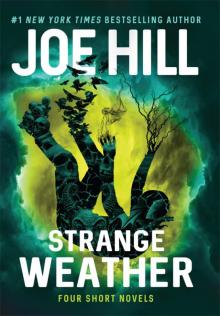 Strange Weather
Strange Weather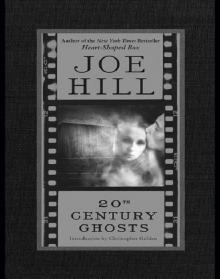 20th Century Ghosts
20th Century Ghosts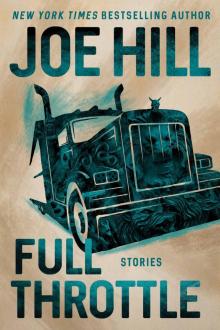 Full Throttle
Full Throttle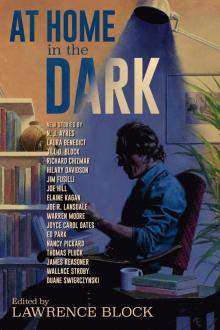 At Home in the Dark
At Home in the Dark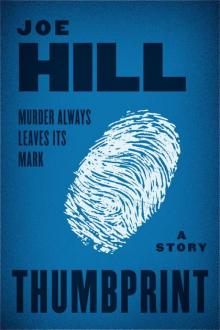 Thumbprint
Thumbprint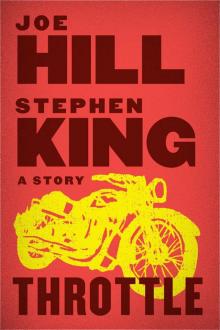 Throttle
Throttle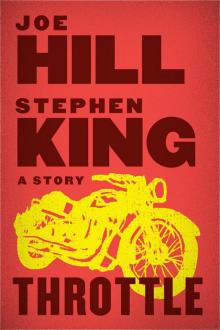 Throttle (Kindle Single)
Throttle (Kindle Single)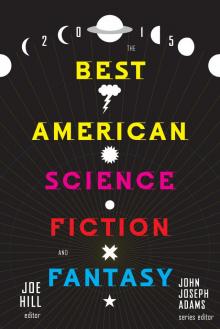 The Best American Science Fiction and Fantasy 2015
The Best American Science Fiction and Fantasy 2015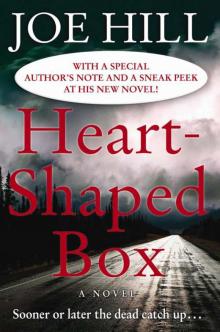 Heart-Shaped Box with Bonus Material
Heart-Shaped Box with Bonus Material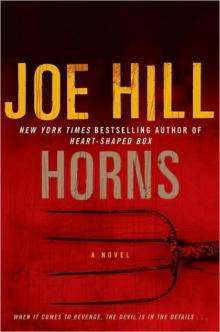 Horns: A Novel
Horns: A Novel